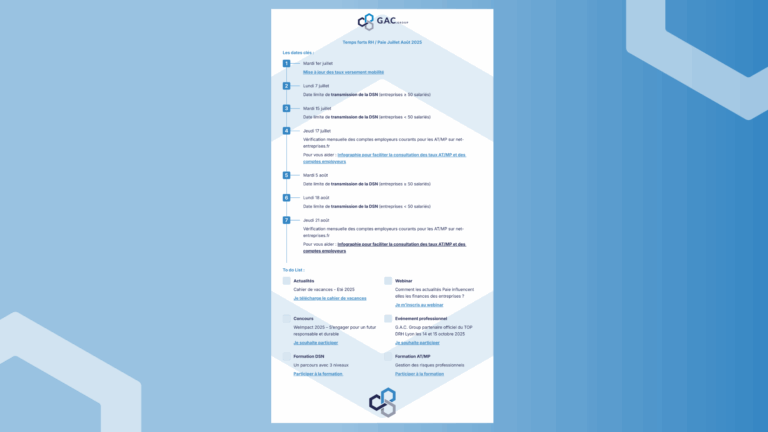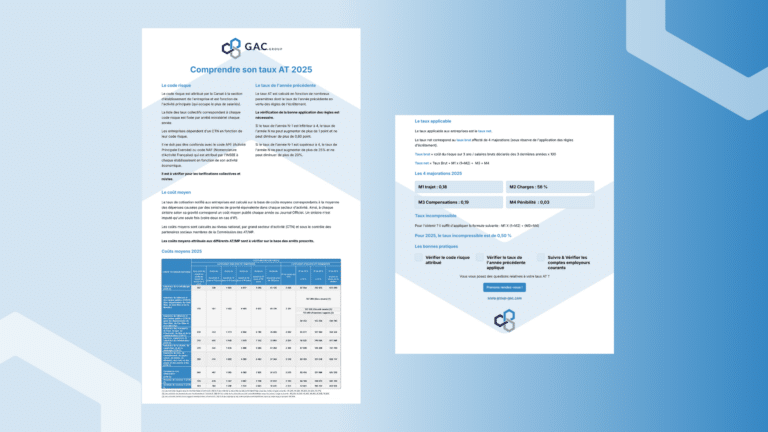EXPERT'S ARTICLE - By Charlotte Launay, HR Performance Consultant, G.A.C. Group
Telecommuting and work accidents
The Minister of Health reminded him that teleworking must be a solution to be promoted "as much as possible" for compatible activities, in particular following the health crisis we are currently experiencing.
With the coronavirus pandemic and periods of confinement, teleworking is becoming widespread and many questions are emerging, particularly those related to the risk of occupational accidents.
How is teleworking defined by the labor code?
Telework means "any form of work organization in which work that could also have been performed on the company's premises is carried out by an employee off these premises on a voluntary basis using information and communication technologies"..
It must relate to tasks which could have been carried out on the premises of the company.
Teleworking takes place outside the company's premises (worker's home, collective space, coworking space, etc.).
Teleworking is generally organized by alternating periods worked at the workplace and in third places or at home.
In terms of planning, teleworking can be arranged in advance, or be of an occasional nature, for specific circumstances.
In practice, the employer will recall, in the collective agreement, in the charter or in the agreement concluded with the teleworker, these provisions concerning the compliance of the telework place.
In application of the Labor Code, the employer has the same obligations in terms of occupational risk prevention with regard to all employees, whether they are teleworkers or not: they are required to take the necessary measures to ensure their safety. and protect their physical and mental health.
Telecommuting and work accidents
The employee in telework remains an employee of the company which employs him. As such, he enjoys the same rights as the employee who performs his work on the company's premises, by virtue of article L.1222-9 of the Labor Code.
This article then specifies that: " An accident that occurs at the teleworker's place of work during the course of his or her professional activity is presumed to be an accident at work within the meaning of Article L. 225-37 of the French Labour Code.article L. 411-1 of the social security code ".
The French Social Security Code defineswork accident in its article L. 411-1, at the end of which:
"An accident at work, whatever its cause, is considered to be any accident caused by or in the course of work to any person employed or working, in any capacity or in any place whatsoever, for one or more employers or company managers.
This article introduces a system of presumption of imputability to work, when the employee provides proof of an accidental event at the time and place of work.
Presumption of imputability of a teleworking employee
The employee placed in telework therefore benefits from this presumption of accountability.
An accident in the workplace is presumed to be :
- at the place where the employee teleworks;
- while working, i.e. during teleworking hours.
Thus, to benefit from the presumption, the employee must provide proof of an accident at the time and place of teleworking.
The employee must also report an injury, whether physical or psychological, and a health professional must be able to ascertain this injury.
However, "it is up to the person claiming to have been the victim of an accident at work to establish, other than by his or her own assertions, the exact circumstances of the accident and its occupational nature". (Cass. soc., May 26, 1994, n ° 92-10.106)
Treatment of the presumption of imputability by the employer
Once established, the employer may, however, rebut the presumption of imputability.
In this context, it is up to the employer to demonstrate:
- that the employee had evaded his authority;
- and/or that the cause of the accident is totally unrelated to work.
In practice, already not easy, the exercise is complicated by teleworking. Indeed, the remote employer cannot control the employee's working conditions.
The employer must therefore be attentive to the account of the events by the employee.
Thus, for example, the employer may notice inconsistencies between the nature of the injuries declared and those observed, or even if the employee is slow to consult a doctor.
The time of the accident is also important. Indeed, it makes it possible to determine whether the accident took place during the teleworker's working hours ...
If there is any doubt as to the professional nature of the event, the employer may express reservations. The CPAM then launches an investigation lasting seventy days. It informs both the employee and the employer. Once the investigation is complete, the contradictory phase begins. The employee and employer can consult the file and make their observations for ten days. The CPAM's decision is made within a maximum of ninety days of receipt of the medical certificate and the declaration of work-related accident.
The declaration of an accident at work is a key step in the management of claims since this directly impacts the ATMP rate of employers.
Do not neglect this step! Also, we advise employers to exercise increased vigilance in drafting work accident reports for teleworkers.
Without forgetting to make reservations in case of doubts about the circumstances of time and place or about the cause totally unrelated to the work of the accident.
Don't hesitate to contact us if you have any questions on the subject.








